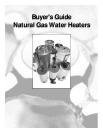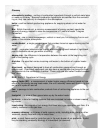
ral gas water heater with a higher efficiency rating might cost a little more to buy than a gas water heater with a lower
E F, but could save you hundreds of dollars over its lifetime in lower operating costs.
One good way to compare equipment is to use the federally required EnergyGuide Label. On a water heater,
as on many other appliances, the yellow EnergyGuide Label shows you what it costs to operate each unit on an annu-
al basis, using national average energy prices. The EnergyGuide will also tell you how a particular model compares
with other similar models. Be sure to compare water heater models with the same first-hour recovery rating when
using the EnergyGuides.
For more specific operating cost estimates, you can figure your annual expense using local costs of energy.
Ask your sales person or a utility representative for actual energy costs in your area, or check your latest gas bill.
Residential gas prices are usually calculated in units called therms. (Atherm is equal to 100,000 Btu.) Locate your
local per/therm cost on the chart below and the estimated therm usage of the water heater. This will give you a good
estimate of the appliance's actual yearly energy costs.
You can also use the chart above to determine what the "payback" period is for buying a higher efficiency water heater.
For example, if your cost per therm of gas is 70 cents, the difference in annual operating costs for a water heater with
an EF of .51 and unit with an EF of .63 is $57. If the more efficient unit costs $100 more than the other unit, you would
pay yourself back for the initial higher cost through lower operating costs in less than two years. So if you plan to live in
your home for longer than 2 years, the higher efficiency model would be the better choice for long-term savings.
Installation and Venting
All natural gas water heaters must be vented to the outdoors to remove the byproducts of combustion. A w i d e
variety of venting options are available, and should be considered when you choose your equipment.
Atmospherically vented gas water heaters are the most common type. Because the flue gases from the
water heater are warmer than the surrounding air, they will rise naturally through a vertical vent pipe or chimney to the
outdoors. These units don’t need help from fans or other mechanical boosters, which keeps installation and operating
costs down. All atmospherically vented gas water heaters can use either a standard metal vent or a masonry chimney.
Direct-vent or horizontally vented water heaters are designed for installations where vertical chimneys or flues
are not available or would be more expensive to install. The vents go directly through an outside wall, and can also
bring in combustion air to the gas burner. Most of these units require zero-clearance at the sides and rear, which allows
them to be installed in a small area.
Fan-assisted or power-vented gas water heaters use an electric fan or blower to push combustion gases to
the outdoors. This type of venting allows gas water heaters to be installed as far as 40 feet away from an outside wall
and in homes without existing vertical vents. The flue or vent pipe can be hidden behind walls and cabinets. Other gas
equipment can be installed with the water heater and use the same power venting system.
If you wish to move a water heater to a different location in your home where natural gas piping is not avail-
able, your contractor may recommend using corrugated stainless steel tubing (CSST) to provide the gas supply. T h i s
relatively new technology is flexible for easier and more economical installation in existing buildings, and is as strong
and safe as traditional rigid metal piping.
Selecting a Qualified Contractor
Water heaters must be installed according to the manufacturer's instructions and vented to comply with all
local building codes and regulations. To locate a qualified plumber or contractor, call your local gas utility and ask for a
list of names; ask your neighbors or friends for names; or look in the Yellow Pages. Be sure to ask contractors for refer-
ences and to check with the Better Business Bureau to make sure that the contractor is properly licensed and bonded.
Your contractor should comply with local codes and regulations, obtain all necessary permits and be up-to-
date on current technology and venting procedures.
P r oper Use and Maintenance
Proper care and use of your gas water heater will help save energy and money, and give you a reliable supply
of hot water for many years. Here are some guidelines:
• Keep the area around your water heater clean and well ventilated. Don’t store papers, clothing or any other
flammable materials near the water heater.
• Sediment and mineral accumulations on the tank bottom can reduce performance. Water heater manufacturers
recommend that you run a quantity of water through the water heater drain valve regularly. See manufacturers’
instructions for details.
• The anode rod that is placed in the water heater as an anti-corrosion device should be checked once a year and
replaced when necessary by a qualified technician.
• When having your natural gas heating system inspected annually, ask the technician to also inspect your gas water
- 4 -












